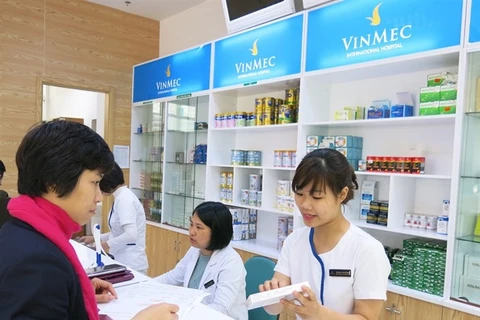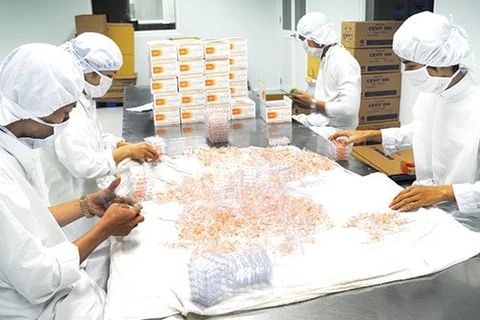Hanoi (VNA) –Vietnam is striving to develop the pharmaceutical industry to level 4, the highest as classified by the World Health Organisation, according to the National Strategy for Pharmaceutical Industry Development by 2023, with a vision toward 2045.
Accordingly, the country is improving research capacity and the application of new drug production technology and promoting clinical pharmacy development. Vietnam is also strengthening supervision of safe and reasonable drug use, aiming to become a centre for new science and medical innovation in the region.
To realise the target, the country must make changes and breakthroughs to quickly approach the world's development achievements.
Currently, the application of advanced technologies such as artificial intelligence (AI), data analysis, virtual reality, blockchain and robotics to health care service have helped save time and cut costs for patients.
The country has set up a National Strategy for Developing the Pharmaceutical Industry to 2023 and vision to 2045. The plan focuses on improving the research capacity and application of available technology to produce generic drugs and new dosage forms. Vietnam aims to become a production and processing centre receiving technology transfer of original brand-name drugs from the ASEAN (Association of South East Asian Nations) region.
By 2030, 100% of drugs will meet disease prevention and treatment needs; drug security and national defence, security, pandemic prevention and control, fixing natural disaster consequences and public health incident recovery; and other urgent drug needs.
Domestically produced drugs strive to meet about 80% of demand and 70% of market value. Vietnam strives to achieve the goal of producing 20% of raw material needs for domestic drug production.
Regarding clinical trials and opportunities to access new drugs and treatment methods, Dr. Dao Van Tu, director of the Clinical Trial Centre of Hanoi’s Cancer (K) Hospital, said that clinical trials play an important role in applying research results.
About 5-6 years ago, many patients and even doctors thought that those participating in clinical trials were "lab mice", but nowadays these thoughts have changed, said Tu.
Reality has shown that in Vietnam, clinical trials are currently only conducted with products qualified for use on humans, not dangerous research, the doctor said.
People participating in clinical research projects have the opportunity to access new treatment methods and in fact, some cancer patients have been cured while participating in research projects, he said.
According to the doctor, clinical trial research in cancer treatment is increasing rapidly in many countries, but in Vietnam there are still some limitations.
The rate of patients participating in clinical trials in Vietnam is currently only 1-2%, while in other countries, this rate is at least 10%.
The reason is that domestic units still lack human resources to carry out clinical trial research.
In addition, slow processing of approving clinical trial research hinders research expansion.
Dr. Ta Manh Hung, Deputy Director of the Drug Administration of Vietnam under the Ministry of Health, said that previously the average annual medicine cost per capita for a Vietnamese person was less than 5 USD. But now it has increased to 70 USD and the domestic pharmaceutical industry has basically met the drug demand.
Vietnam is considered one of the countries with the lowest rate of counterfeit drugs in the region, Hung said.
In recent years, sub-standard drugs are less than 2% of the total number of samples taken on the market, as compared to over 10 % in the 1990s, he said.
Regarding production, Vietnam has developed a large number of pharmaceutical enterprises. However, domestically produced drugs are not highly competitive.
More than 200 enterprises produce generic drugs. There are more than 800 pharmaceutical precursors circulating in the domestic market, but the number of precursors produced by domestic enterprises is less than 50%.
"At present, nearly 90% of raw materials for drug production are imported. The proportion of drugs assessed as bio-equivalent is low, only about 10%,” Hung said.
“Therefore, one of the goals of developing the pharmaceutical industry in the near future is to partially shift from producing generic drugs to patent drugs,” he said.
He also recommended some solutions to realise the targets of developing the pharmaceutical industry. These include improvement of institutions and laws on drug production, business, and import-export, supply and distribution. Offering the highest incentives to technology research and transfer to produce innovative drugs, vaccines and biological products will help build the industry.
It is necessary to plan, arrange and reserve land funds for the development of drug research and production facilities, as well as zone off growing areas and exploitation and processing areas of medicinal herbs in the country.
In addition, the State management agencies must improve management capacity and control the market of drugs and medicinal ingredients, especially testing vaccines and biological products.
It is essential to promote research and international cooperation to develop generic and specialised drugs, as well as set up roadmaps to standardise basic and advanced training activities for the pharmaceutical workforce, he added.
Ambassador Julien Guerrier, head of the European Union (EU) Delegation to Vietnam, praised the National Strategy for Pharmaceutical Industry Development by 2023, with a vision toward 2045. He said that Vietnam’s policies that have been issued and are being amended will increase opportunities to access the latest medications and treatment methods in the country.
The Ambassador also expressed his belief that Vietnam will see significant progress in health care with the use of cutting edge technology in the coming time./.























